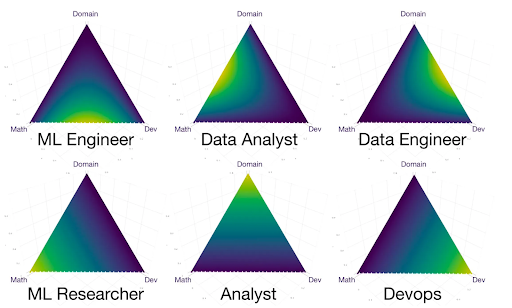Who is the world of analytics suitable for?
In a world where every click, every interaction and every transaction turns into data, the ability to understand and interpret this flow of information becomes increasingly valuable. Data is the gold of our time, an invisible asset that, in the right hands, can transform business, science, and even everyday life. At the center of this revolution is the analytics profession, a key player in the process of turning raw data into valuable insights and strategic decisions. Alexey Babenkov will tell us about this today.


Alexey Babenkov
Machine learning engineer in search, Avito
I work with algorithms for generating search results
Ex-Team Lead, Kvant
Data analysts are at the forefront of this front, working with massive amounts of information to identify trends, predict behavior and improve efficiency. They have a unique skill set that combines technical savvy, analytical thinking, and even intuition. This career is especially attractive to those who prefer analytical work to interacting with people, offering a unique opportunity to engage in research and discovery in the world of data.
Every year the importance of data only increases, and along with this, the demand for qualified analysts grows. From business operations to marketing strategies, healthcare to finance, there is no industry where analysts do not play a key role in decision making. If you're looking for a career where every day brings new challenges and learning opportunities, and where your work can have a meaningful impact on the world around you, welcome to the world of data analytics.
Who is an analyst
An analyst is a professional who is dedicated to extracting meaningful information from data. The role of an analyst varies depending on the industry and the specific data with which he works, but his main goal is always to turn data into knowledge and strategies that will help the business or organization grow and make informed decisions. Now we will note the types of analysts.
Business analysts. These professionals analyze business processes and requirements to help improve efficiency and implement data-driven strategies.
System analysts. Concentrates on information systems, their analysis and design to meet business goals.
Financial analysts. Responsible for analyzing financial information to assist in investment decisions and budgeting.
Research analysts. Focuses on collecting and analyzing data for scientific and government research.
Among all types of analysts, the one who stands out is research analyst (data analyst). Let us consider the varieties of this role in more detail, based on the illustration from articles by Valery Babushkin.

We see how data professionals can specialize based on the skills and knowledge required in three key areas: Math, Dev, and Domain. This distribution helps to understand that not all data scientists are analysts in the classical sense of the word.
ML Engineer and Data Engineer. These roles are more development and engineering, but their work is inextricably linked to data analytics. They create systems and infrastructures that enable analysts to effectively interact with data.
Data Analyst. Directly analyzes data, turning it into reports and insights that business users can use.
M.L. Researcher. Focuses on developing new machine learning methods and algorithms, which often requires deep knowledge of mathematics and statistics.
Data analysts stand out for their ability to not only work with numbers and algorithms, but also interpret the results in a way that makes sense to solve business problems. They must be able to ask the right questions and use data to obtain answers that can be applied to improve the company's products, services and operational efficiency.
Thus, data analysts are the bridge between technology and business decisions, and their role is becoming increasingly important in decision-oriented companies.
Less communication, more data
The analyst profession is ideal for those who find pleasure in working with data and analysis, preferring it to communicating with people. This doesn't mean that analysts don't have to interact with colleagues or clients at all, but most of their work involves analyzing information rather than constant communication.
Data analytics requires diving deep into information, studying trends and looking for patterns. This activity is for those who can spend hours focusing on numbers and tables, finding satisfaction in solving complex problems and creating data models. Such people often have a high degree of independence, preferring to work in silence rather than communicate in large teams.
Analysts perform a wide range of tasks, from simple data collection and processing to complex modeling and forecasting. Let's look at examples of these tasks.
Analysis of consumer behavior. Study data about purchases, reviews and user behavior on the website to improve products and services.
The financial analysis. Forecasting income and expenses, analyzing market trends to support strategic planning.
Supply chain optimization. Analysis of logistics data to reduce costs and increase delivery efficiency.
Development of recommendation systems. Using machine learning algorithms to create personalized product or service offerings.
These tasks require not only technical skills, but also the ability to see the “big picture,” understanding how data analytics can influence business strategies and decisions. The work of an analyst involves not only completing tasks, but also providing recommendations based on data that can bring real benefit to the organization.
Thus, the analyst profession becomes an ideal choice for those who are passionate about data and analytics, preferring technical tasks to communication and management.
Required skills and competencies
To become a successful analyst, you need to develop both technical and analytical skills (as well as certain soft skills). Here's a more detailed overview of the required competencies.
technical skills
Programming languages. Knowledge of SQL is required for working with databases, and Python for data processing, statistical analysis and machine learning. R is also popular in statistical research and data analysis.
Visualization tools. Data visualization is a key skill for an analyst because it allows complex analytical findings to be presented in an understandable way. Tools like Tableau and Power BI allow you to create interactive reports and dashboards.
Working with databases. Understanding how databases work and being able to effectively retrieve information from them is a fundamental skill. This includes knowledge of database management systems such as MySQL, PostgreSQL and NoSQL databases like MongoDB.
Analytical skills
Critical thinking. Ability to analyze facts, make sense of complex data, and identify hidden patterns and trends. Critical thinking helps in asking the right questions and finding effective ways to solve problems.
Problem solving. Analysts often have to deal with non-routine problems that require creativity and the ability to quickly find solutions.
Statistical analysis. Understanding statistical methods and tests is important for analyzing data and drawing conclusions from it.
Soft skills
Attention to detail. When working with large amounts of data, it's easy to miss important details. The analyst must have a high degree of care and accuracy.
Self-learning ability. Technologies and methods of data analysis are developing at incredible speed. Analysts must continually educate themselves to stay up to date with current trends and tools.
Communication skills. Although the job of an analyst involves less communication than many other professions, the ability to communicate your ideas clearly and persuasively to colleagues and management is critical to successful data-driven decision making.
Possession of these skills and competencies opens up wide opportunities for analysts for career growth and development in various industries. The desire for constant self-development and deepening knowledge in the field of data analytics will help not only achieve success in this profession, but also have a significant impact on the efficiency and innovative development of companies and organizations.
Benefits of work and first steps
In an environment where data is increasingly important, analytics professionals are more in demand than ever. This gives them confidence in the professional field and opens up broad prospects for career development. Professionals in this field can expect competitive salaries that reflect the complexity and importance of their work. Data analytics opens doors to different industries, allowing professionals to move between them and apply their accumulated experience to solve new problems.
You can start a career in analytics without having a specialized education. The skills and knowledge that can be gained through online courses and self-study are important. Practical experience gained through internships and own projects is valued by employers no less than diplomas. Networking through professional communities can help you make connections and learn about new opportunities.
Conclusion
In this review, we revealed the significance and features of the work of analysts in the field of data processing. The profession offers attractive working conditions, including high salaries and many opportunities for professional growth. You can begin your journey in analytics through active learning and involvement in practical projects, which will be your entry into the exciting world of data analysis.
This path is suitable for those who love data analysis and are committed to continuous learning. The world of analytics is constantly expanding, offering unlimited opportunities for development and discovery. Let this resource inspire you to explore the world of data further, turning your career into an exciting adventure.
The material was written with the support of the ProductStar editors. Click here to find out who we are and what we do.
ProductStar — an online school of IT professions, since 2023 we have been part of the RBC holding. Follow this link you can subscribe to us on Telegram, and here — look at the list of all our analytics courses.





